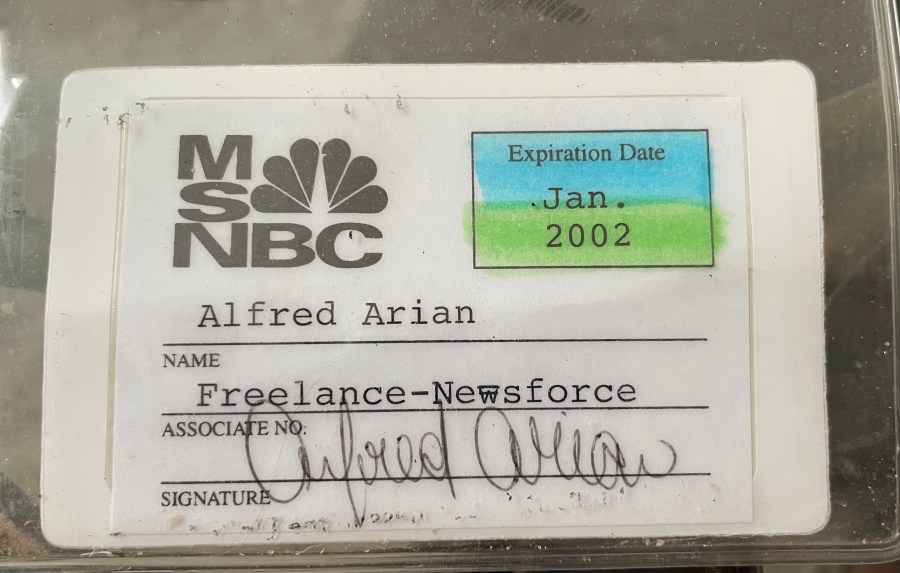
The plume of smoke was easy to spot from Alfred Arian’s Jersey City office. He was translating government documents like birth and marriage certificates when he got a call from an NBC contractor on Sept. 11, 2001. The network needed a translator to do a live translation with a news anchor. He packed up and arrived at the studio at 7p.m. Little did he know this would be the beginning of his 22-year career at NBC.
“I covered the world reaction to 9/11 and the Afghanistan War at a time when no reporter was on the ground,” Arian said. “I realized that the U.S. was preparing for a long struggle in the Middle East — not only translating for the news but more gathering the news.”


A graduate in social work from Cairo University, Arian later earned a political science degree from New Jersey City University. He has utilized his knowledge of the many different Arabic dialects as NBC’s Newsgathering Arabic translator. His role ranges from assisting reporters in live translations to verifying the accuracy of social media videos and making sure voiceovers and subtitles are correct. He has gone on to translate for breaking news during other historic moments – the Iraq and Afghanistan Wars, the Israeli-Lebanon War, the rise of ISIS and Al-Qaeda and the Arab Spring Revolution.
Many stories would not be told without translators. Translation is vital for news when there is conflict and for understanding what is happening in communities domestically and abroad. Through newsgathering, verification of sources and providing cultural context, translators like Arian deepen the public’s understanding of world news.
Newsgathering and verification
One part of Arian’s role is to track and find stories in Arabic-speaking regions. He checks local news outlets and Twitter, verifying and translating information at the same time, then logging it into NBC’s News Connect platform, where correspondents or producers can locate sources for reporting. For example, if a producer on “Dateline” or “Nightly News” wants to investigate a story, he’ll interview people and translate the information for them.
“Not all news makes the news, so you have to dig in,” Arian said. “You have to verify, and most importantly, you have to be accurate and fast. The challenge is you have to be on top of everything, every day and every hour.”

When people on the ground share breaking news through social media videos, Arian reviews and notifies the newsgathering desk for coverage opportunities. He works with NBC’s Standards and Social Newsgathering teams to verify videos and ensure they are appropriate for air since many events he covers are fraught with conflict.
“I don’t give the newsgathering desk good news. It’s always bad news,” he said. “It was stressful during the war in Afghanistan, in Iraq, because the videos that we used to see were horrible.”
Arian’s translation skills are not just relevant in times of war. When a massive earthquake hit Syria and Turkey in February, Arian helped Newsgathering quickly translate Twitter posts that contributed to editorial coverage and news packages.
One of his other responsibilities is to verify whether what is deemed news is even true. Arian recalls that in 2003 a video on the internet surfaced, claiming to show Al-Qaeda capturing U.S. soldiers. “It wasn’t published on the Al-Qaeda websites and sources, and also because I speak Arabic, I looked at the video and realized that they were not Al-Qaeda; they didn’t speak the same language,” Arian said. While some outlets aired the fake video, NBC and MSNBC held off sharing it with Arian’s guidance.

Cultural context, flexibility and accuracy
Advances in technology have made translation accessible, but translation apps can only get a reporter so far. Nuance in delivery and common idioms are tough for an app or AI to accurately convert into another language. Not only does Arian make sure words and meanings are correct; he also ensures that cultural context is not lost in the process.
There are numerous dialects in the Arab world, each one with different interpretations for words. Arian cites moments where important figures have used words with double meanings. “During a press conference, the Iraqi information minister used the ‘white brothel’ to refer to the White House,” he said. “New terminology in the old Arabic language can’t be found in technology.”
Human translators can also verify information from multiple sources like local news outlets, social media, reporters on the ground and eyewitnesses. “In every Arabic word, we have six or seven English meanings. So, 100% the app will make a mistake,” he said. Grammar is also a challenge for technology where a human translator can review and edit as they go.
Translation is also necessary when it comes to live coverage and ensuring certain words are not said on air. “The Iraqi information minister used a curse word back in 2003,” Arian said, “and you cannot translate everything he says live on air when it comes to cursing.”
Despite the rigor of covering breaking news in the Middle East, Arian understands the importance of his job. “My favorite part is to make a difference in the newsroom,” he said. “You know, ‘We got this, let’s do this, we first aired [it] and it’s accurate.’ So, I just feel proud. This is what keeps me going every single day.”
Arian’s Translation Work in NBC News Stories
Syrians Trapped in Aleppo Using WhatsApp to Post Cries for Help
Gaza has access to less than 40% of the energy it needs. Locals hope solar power can fill the gap.
Khashoggi’s fiancée says Saudi crown prince should be punished “without delay”
Lebanon’s coronavirus lockdown stokes hunger, fear among desperate families



